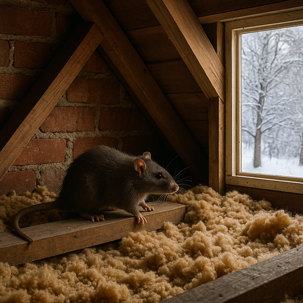During Idaho’s coldest months, many Treasure Valley homeowners begin hearing strange scratching, tapping, or scurrying noises inside their walls or ceilings. These sounds often show up at night, get louder over time, and may come with other signs - chewed items, small droppings, or insulation pushed out of place.
Winter is peak rodent-entry season in Nampa, Boise, Meridian, Caldwell, and surrounding communities. When temperatures drop, mice and rats seek warmth, food, and shelter, and our homes become the perfect environment. If you’ve started noticing unusual noises coming from your walls or attic, there’s a good chance rodents have found a way inside.
Why Rodents Enter Idaho Homes During Winter
Idaho winters bring long stretches of freezing temperatures. Unlike insects, rodents remain active year-round, so they must find warm shelter to survive. Your home provides:
1. Heat and protection from the elements
Even tiny gaps near crawl spaces, siding, roofing, or utility penetrations act as gateways to warmth. Mice only need an opening the size of a dime to enter.
2. Reliable food sources
Pantries, pet food containers, leftover holiday baking supplies, and even bird seed stored in garages attract rodents quickly.
3. Secure nesting areas
Rodents prefer undisturbed spaces such as:
- Wall voids
- Crawl spaces
- Attics
- Under kitchen cabinets
- Behind appliances
Once inside, they build nests and can reproduce rapidly during the winter months.
Common Signs of Winter Rodent Activity in Idaho Homes
Scratching or scurrying sounds
These are most noticeable at night and usually come from walls, ceilings, or behind cabinets.
Droppings or tracking marks
Rodent droppings are small, dark, and pointed at the ends. Tracks often show up along baseboards or dusty areas.
Chew marks
Wires, insulation, food containers, and stored holiday decorations are frequently damaged.
Entry holes around the home
Gaps around garage doors, utility lines, foundation vents, and roof intersections are among the most common access points.
Insulation disturbance in attics
Rodents often burrow, flatten, or tear apart insulation to create nests.
Why You Hear More Scratching in the Walls During Winter
Winter scratching is not random - it’s predictable and tied to rodent behavior.
1. Rodents become more active at night
As nocturnal animals, much of their movement, feeding, and exploring happens when the house is quiet.
2. Cold temperatures increase indoor activity
When severe cold pushes them deeper into the structure, the noises tend to intensify.
3. Growing rodent families mean more noise
If you’re hearing frequent scratching over several weeks, that usually means nesting has begun.
4. Expanding infestations explore new areas
Once established, rodents explore ductwork, chase ways, insulation tunnels, attic beams, and wall voids - creating the noises homeowners hear most.
How Rodents Get Into Idaho Homes
Most Idaho homes contain small vulnerabilities that widen over time with wind, moisture, or general settling. Winter makes these gaps even more noticeable.
Typical entry points include:
- Gaps around AC lines or utility conduits
- Damaged crawl space vents
- Unsealed foundation cracks
- Openings in attic or roofline intersections
- Garage door gaps
- Uncapped attic roof vents
- Plumbing penetrations under sinks
Idaho’s frequent temperature swings and strong winds can loosen siding or weatherstripping - making the problem worse.
How to Stop Mice From Entering Your Idaho Home
The key to long-term rodent prevention is a combination of inspection, sealing entry points, trapping, and habitat reduction.
1. Seal exterior entry points
Use steel wool, hardware cloth, or rodent-proof sealants - NOT foam alone. Foam is easily chewed through.
2. Eliminate food sources
Store all pantry items and pet food in sealed containers. Clean crumbs and spills promptly.
3. Reduce sheltering opportunities
Declutter garages, basements, and storage spaces. Move items off the ground when possible.
4. Address moisture
Fix leaky pipes and ensure proper ventilation. Rodents gravitate to warm, moist areas.
5. Install door sweeps and weatherstripping
Especially on older Treasure Valley homes where garage doors are common entry points.
6. Schedule a professional rodent inspection
A trained technician can identify subtle access points, evaluate attic or crawl space activity, and create a complete exclusion plan.
When to Call for Professional Rodent Control in Nampa and the Treasure Valley
Rodent infestations escalate quickly, especially during cold weather. You should contact a licensed technician if:
- You hear scratching, running, or chewing for more than one or two nights
- Droppings appear in pantries, garages, or utility rooms
- You find insulation damage or chew marks
- You attempt DIY traps but noises continue
- You suspect activity in the attic or crawl space
Pestcom’s technicians are individually licensed by the Idaho Department of Agriculture and trained to locate rodent entry points efficiently. Winter rodent behavior in Idaho is highly predictable - fast action can prevent structural damage, wiring hazards, and contamination.
Protect Your Home This Winter
If you're hearing noises in the walls or attic, you are not alone - rodent calls surge across the Treasure Valley every winter. Early detection and targeted prevention help protect your home and family long before spring arrives.
Pestcom provides comprehensive inspections, minor exclusion repairs, trapping, and long-term prevention to stop rodents fast and keep them out for good.

